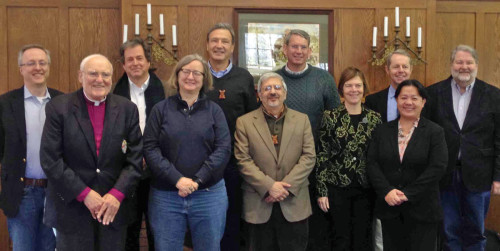Press release:
The Council of Deans met in its annual meeting at the Bexley Seabury campus in Columbus, Ohio Sunday, January 11 to Tuesday, January 13, 2015.
All 10 seminary deans were present at the meeting, joined by their academic deans, as well as the dean and president of St. Andrew’s Theological Seminary in the Philippines. Across a range of theological viewpoints, there was a shared commitment to theological education and formation as well as mutual recognition of the distinctive gifts of each school.
The Council of Deans recognized the many opportunities and challenges facing theological education in the United States. There was an appreciation of the sheer variety of programs that, collectively, Episcopal seminaries are providing in response to our changing world and church. In addition to the three-year residential MDiv, the MDiv can be taken in hybrid, distance, and part-time forms. Theological studies can be as short as a summer or a January term, to a quarter, to a semester, to a full year or more. Training is provided in Spanish language and Latino/a culture, and different tracks are offered in missional leadership; hospital, school, and military chaplaincy; and community organizing. MA and other degrees are offered in counseling, Christian formation, ministry, and all the major academic disciplines. There is a plethora of certificate and short-residency courses for lay and ordained leaders.
In recent years, three seminaries have completed or are in the process of completing capital campaigns. In all, over $40 million has been raised thus far. The demographics of Episcopal seminary student bodies are increasingly young and diverse. Placement rates are high, with many seminaries reporting over 90% of graduates placed within six months. This confirms the data from the Church Pension Fund that established the high placement rate and subsequent vocational progress made possible by an Episcopal seminary education. Several seminaries are engaged in thoughtful restructuring and reorganization that will ensure long-term sustainability and relevance.
The Council of Deans will seek conversation with diocesan leadership to recruit gifted candidates for leadership in the church. Discussion began about sharing opportunities for cross-cultural immersion among the 10 seminaries, as well as exploring cross-registration among our programs.
The Council of Deans concluded its meeting by affirming its commitment to continue to serve the church both domestically and globally. The Council welcomes conversations with all parties in the Episcopal Church about the future needs of the church.
The Rt. Rev. J. Neil Alexander, Dean of the School of Theology of the University of the South
The Very Rev. Kurt Dunkle, Dean and President, General Theological Seminary
The Rev. Roger Ferlo, President, Bexley Hall Seabury Western Theological Seminary Federation
The Very Rev. Cynthia Briggs Kittredge, Dean and President, Seminary of the Southwest
The Very Rev. Ian Markham, Dean and President, Virginia Theological Seminary
The Very Rev. Andrew McGowan, Dean and President, Berkeley Divinity School at Yale
The Very Rev. Gloria Lita D. Mapangdol, St. Andrew’s Theological Seminary, Quezon City, Philippines
The Very Rev. Katherine Ragsdale, Dean and President, Episcopal Divinity School
The Very Rev. Mark Richardson, Dean and President, Church Divinity School of the Pacific
The Rt. Rev. Edward Salmon, Dean and President, Nashotah House
The Very Rev. Justyn Terry, Dean and President, Trinity School for Ministry
What are your thoughts — a rosy picture at odds with your prior perception? Believable? Need more direct evidence?
Posted by John B. Chilton

